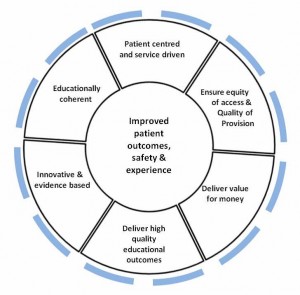Technology Enhanced Learning (TEL)
Technology Enhanced Learning (TEL) is the use of technology as part of a learning process.
TEL covers projects related to eLearning, mobile apps and simulation themed. TEL ensures strategies and actions are framed upon a vision that healthcare is underpinned by world-class education and training that is enhanced through innovation and the use of existing, evidence-based and emergent technologies and techniques.
TEL Is supported by the Library and Knowledge Services and Technology Enhanced Learning Team in the Midlands and East. The regional TEL lead is Dr Ruth Carlyle, supported by Noel Cudden, TEL & LKS Development Manager. The first point of contact for TEL queries from the East of England is Richard Bridgen richard.bridgen@hee.nhs.uk. For eLfH queries, please email tel@hee.nhs.uk
Charlotte is responsible for the strategic direction of TEL in the East of England.
The National website is found here.
Our aim
October 2013 saw the announcement of the Health Education England (HEE) and the Higher Education Academy (HEA) Technology Enhanced Learning (TEL) programme, which has been established to oversee the launch and development of a TEL hub.
The TEL hub, due for launch in the autumn, will be designed to be the go-to place for TEL information and resources that are supporting the delivery of high quality healthcare education and training, in the areas of simulation, e-Learning and m-Learning (mobile learning).

The hub will be aligned to the six core principles in the Department of Health’s A Framework for Technology Enhanced Learning that should underpin world-class education.
1. Be patient–centred and service-driven – technological applications must focus on equipping the workforce with the necessary skills for safe and effective patient care
2. Be educationally coherent – any technological application should address clearly articulated learning needs that are aligned to service needs
3. Be innovative and evidence-based – applications should enhance training, be informed by the best available evidence, and where possible be future-proof by being flexible and adaptive so minimising redundancy
4. Deliver high quality educational outcomes – meets and, wherever possible, exceeds agreed standards
5. Deliver value for money – technological applications should enhance training, improve productivity, reduce duplication and be affordable and cost effective
6. Ensure equity of access and quality of provision – applies across the health and social care workforce.
http://hee.nhs.uk/work-programmes/tel/tel-faqs/#anchor1